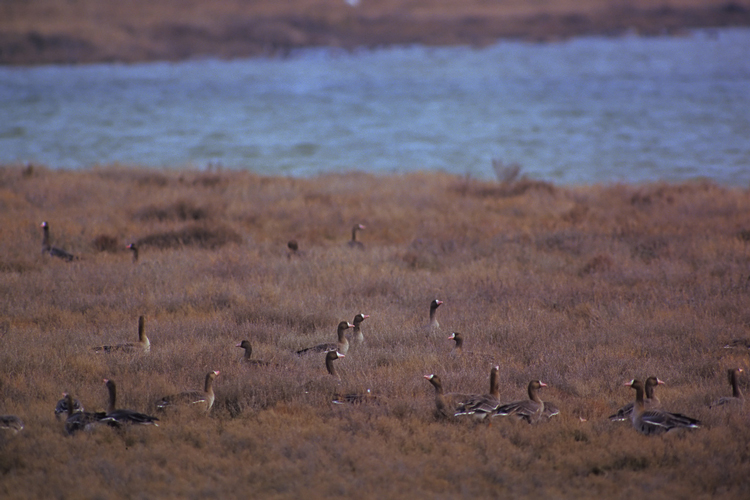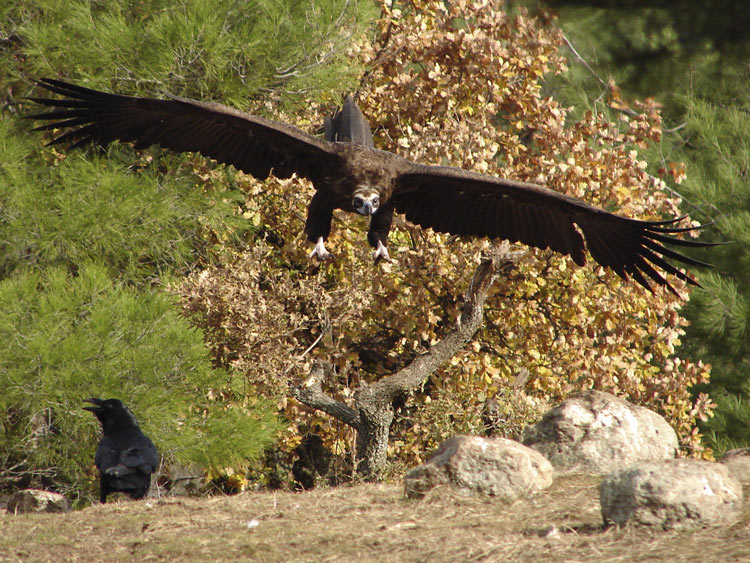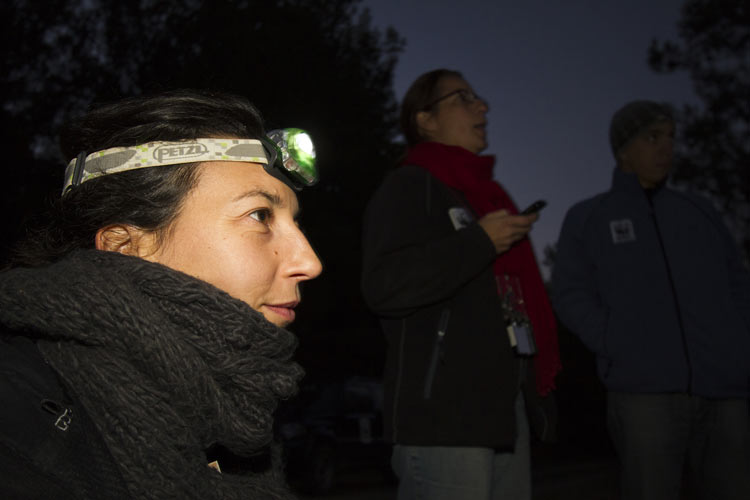At the northeastern end of Greece, in a part mostly mentioned in stories about the frontiers and military service, lies a treasure of biodiversity unique in Europe. 2 National Parks (Dadia-Lefkimi-Soufli and Evros Delta) and 5 Natura sites in the area attest to its value.
320 species of birds, more than 65 species of mammals and a wide diversity of reptiles and amphibians make up this heaven on earth, which is not only home to its permanent residents but also an important stopover site for migrating birds in the eastern Mediterranean.
The Evros Delta
One of the main elements that make the area so favorable to life is the Evros Delta. It is perhaps the most significant wetland for bird migration and wintering in Greece. Part of it has been declared a Wetland of International Importance under the Ramsar Convention. It combines rich biodiversity with a variety of human activities.

© A. Bonetti / WWF Greece
The Delta includes a variety of wetland habitats, important grasslands, natural fish nurseries and several rather unreachable areas and hosts a wide variety of aquatic organisms and breeding populations of rare birds. It is considered the last good aquatic bird hunting ground in Greece. Agriculture, animal husbandry, professional and recreational fishing (fresh water, lagoon and sea), hunting, environmental education, ecotourism, scientific research and environmental monitoring, all take place in this wetland. Overlapping and intensive land use causes major management problems in the area, which also suffers the consequences of illegal hunting.
Based in Dadia, our permanent local unit has undertaken diverse activities in the area, documenting the developments in the Evros Delta and contributing to the improvement of its management and protection.
Dadia, a Unique Mosaic for the Raptors of Europe
In 1979, in the Forest of Dadia in Evros, we started one of the oldest and most successful WWF projects. It was due to our efforts that the protection of this unique forest, home to 36 of the 38 European birds of prey, was legally established in 1981. In the early 1990s, a scientific group took up residence in the area to methodically address the needs of the Dadia-Lefkimi-Soufli forest and the threats that it faced.

© P. Babakas / WWF Greece
For European raptors, the choice of the Dadia-Lefkimi-Soufli forest as one of their main habitats is not an arbitrary one. The mosaic composed by extensive mature forests interrupted by clearings, small grasslands and cultivated areas is the ideal environment for these impressive species, which have become symbolic of the area.
It is one of the few areas in Europe where 3 out of the 4 European vulture species coexist and breed. Of them, the black vulture (Aegypius monachus) is the flagship species of the area, as Dadia holds its only breeding colony in Greece and the Balkans. The area of Thrace hosts the most successfully breeding population of the smallest of the vultures, the endangered Egyptian vulture (Neophron percnopterus). During the past 10 years, the Greek population has collapsed, and less than 15 pairs remain, 5 of them in the forest of Dadia.
Today, Dadia is one of the best-managed protected areas in Greece. Designated as a National Park in 2006, the area is bordered by the municipality of Soufli, which is built around two settlements (Tychero and Soufli) with a population of 11,000, mostly engaged in animal husbandry, agriculture, logging and ecotourism.
Having decisively contributed to the efficient management of the area, WWF volunteers and partners continue in their endeavor and further develop their activities to answer the new environmental challenges.
Our Actions
1) Wind Farms in Evros and Rodopi
We monitor and document the possible impact of wind farms on large raptors and promote good practices in the spatial planning of wind farms in the area, which has been declared a Wind Priority Area (WPA).
Read our 2013 proposal regarding the spatial planning of wind farms in Thrace (in Greek).
Between 2008– 2010, we conducted a targeted study to assess the impact of wind farms on the area’s birds of prey. Read the results of the study and more on our overall approach (in Greek):
- Memorandum: A Different Approach to Wind Farm Development in the Central Region of the Prefectures of Evros and Rodopi Is Imperative
- Assessing the Impact of Nine Established Wind farms on Birds of Prey in Thrace 2008–2009
- Impact Assessment of Wind Farms on Birds of Prey in Thrace | Annual Report 2009–2010
- Impact Assessment of Wind Farms on Bats in Thrace during the Period of July 2008–August 2010 (in Greek)
2) Black Vulture
Our activity in the area has already yielded significant results regarding the black vulture, and its population has increased from 16 pairs and 55 individuals recorded in 1992 to 28 pairs and 90–100 individuals in the last 5 years. Our permanent scientific unit is involved in the conservation of the species at every level.
Read more on our actions regarding the black vulture and the Egyptian vulture.
3) Raptors
We have established a system for monitoring the Park’s natural parameters.
Specifically, during 1999–2005, the monitoring project collected data regarding: the estimated number of territories of all the diurnal raptor species, the landscape and vegetation by analyzing satellite images and several human-related parameters. We repeated the monitoring project after almost ten years, in 2012, to identify and assess the changes in vegetation and raptor presence.
We monitor the breeding success of the griffon vulture and other important raptor species outside the National Park’s borders, gathering information on their nesting sites and on possible threats.
4) National Parks
We participate in the Board of the Management Body of the Dadia-Lefkimi-Soufli Forest National Park as well as in that of the Evros Delta.
5) Tourism
Dadia is one of the most popular ecotourism destinations in Greece. Operating since 1993, the information center has received up to 50,000 visitors per year, yielding considerable economic benefits to the local community and neighboring areas, such as the creation of many job opportunities for local women and young people, and increased demand for provided services. The center, combined with the hostel and refreshment area, has welcomed visitors from all over Greece and Europe, under the management of the local municipal enterprise. Today, the entire ecotourism complex and the information center are managed by the Management Body of the Dadia-Lefkimi-Soufli Forest National Park.
We have contributed to the development of sustainable tourism in the area. Specifically, since the inauguration of the Ecotourism Center of Dadia and during the first ten years of its operation (1993–2003), WWF Greece has greatly contributed to development planning in Dadia by opening and marking forest trails and constructing visitor infrastructure, such as the hostel and information center, as well as by operating the Dadia Information Center.
In addition, we conducted a study regarding the assessment and rationalization of tourism in the Evros Delta on behalf of the Management Body and held seminars on ecotourism development in the visitor centers of Dadia and Loutra.
6) Volunteers
Because of our presence in Dadia, not only is the area preserved as a refuge for European raptors, but it has become a center of attraction for active youth from all over Europe.

© A. Bonetti / WWF Greece
The scientific team of WWF Greece in Dadia welcomes volunteers of the European Voluntary Service (EVS) from different European countries.
Up to six young volunteers stay with us in Dadia every year, participating in activities such as monitoring vultures and the impact of wind farms on raptors. During their stay, volunteers have the opportunity to learn Greek and participate in local cultural events. In some cases and under certain conditions, volunteers may plan and carry out their own environmental project.
Since 2003, WWF Greece has hosted more than 40 volunteers from 12 European countries.
In addition, WWF volunteer summer camps have been organized in Dadia, Lefkimi, Melia and Loutra.
7) Scientific Knowledge
We disseminate the scientific knowledge acquired through our activities and projects by actively participating in Greek and international conferences, networks and forums, producing scientific publications and getting involved in information and awareness events.
Project leader: Dora Skartsi, This email address is being protected from spambots. You need JavaScript enabled to view it., 0030 25540 32210
Share this



